How to Make Peace with Food

Is there really such a thing as food addiction? Is it possible to keep your “trigger foods” in your house and not overeat them? Read below to find out how to make peace with food, not feel controlled by certain foods, decrease your cravings, and not feel that intense urgency to eat (hint: it’s not what you think!).
If you’re ready to take the next step in leaving dieting behind and healing your relationship with food, you can learn more about this in my online Unapologetic Eating 101 Course!
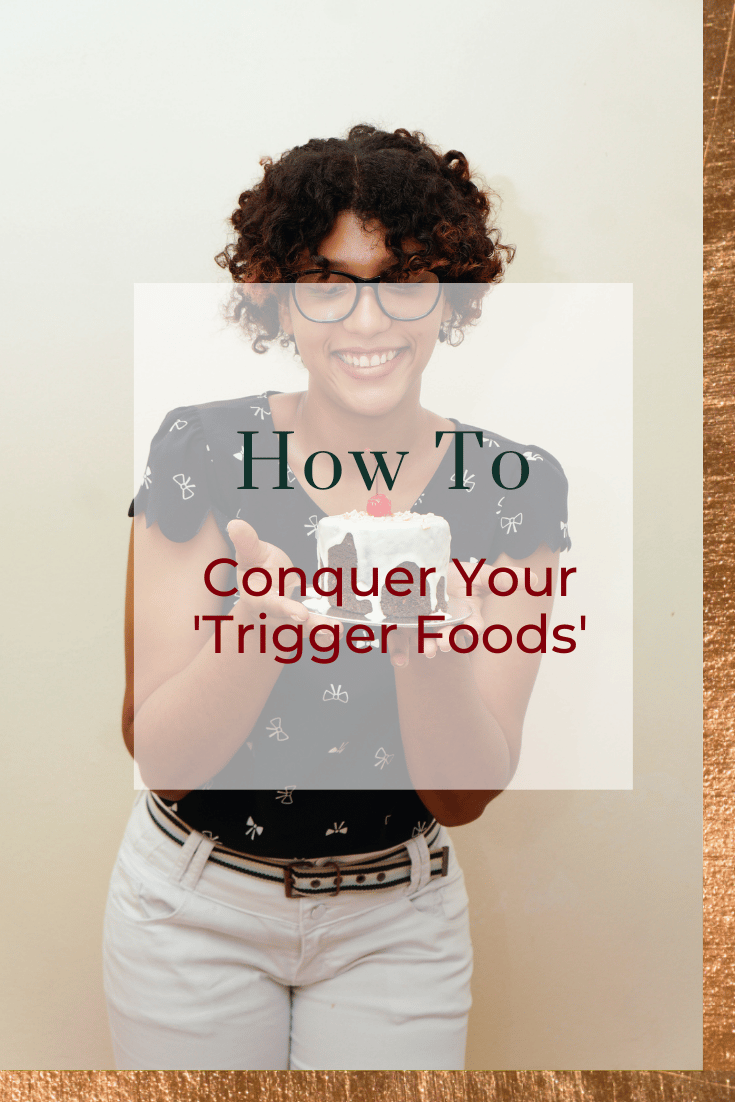
Dieting teaches us that we can’t control ourselves around food. That we need external controls or rules around what and when we can and can not eat, or else will go off the rails. But in reality, it is actually dieting and restricting foods that cause overeating.
Whenever we restrict ourselves, keep foods off-limits and out of the house, or look at certain foods as “good” or “bad”, we end up going overboard or have a hard time saying no whenever we do have access to those foods. Restriction and deprivation breed guilt, which eventually leads to overeating or binging. Whenever you limit the amount or type of food you eat, you’re setting yourself up to overeat in the future. This is why one of the main principles of intuitive eating is to make peace with food.
The Guilt-Deprivation Seesaw
Let’s use a seesaw example. When you are dieting, guilt goes down – because you’re “on the wagon” – but deprivation goes way up because you are restricting what you are eating.
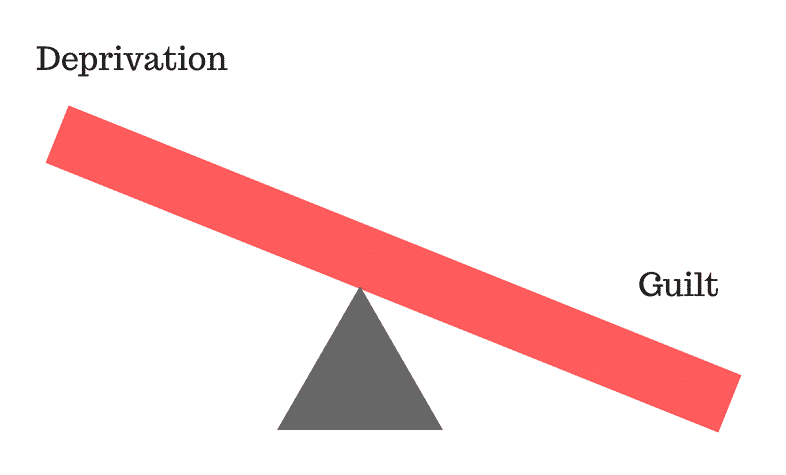
Eventually, it reaches a tipping point and you give in and eat the foods you had been not allowing yourself. Then deprivation goes down but guilt goes up.
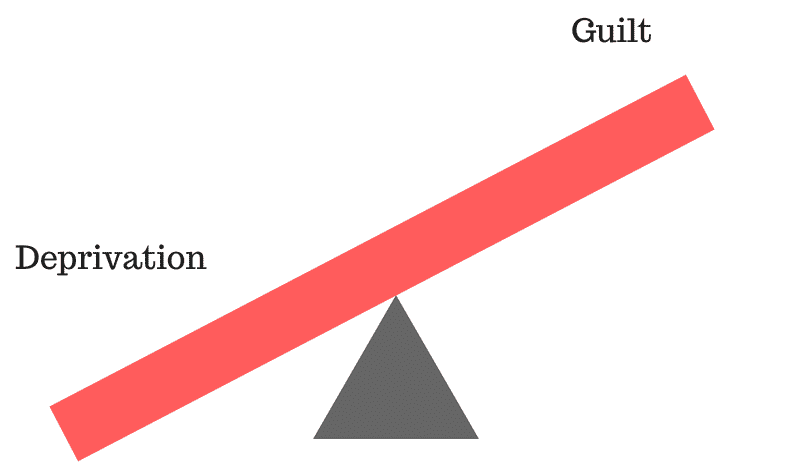
Now you may be thinking “but I’m not even on a diet.” Take a step back and ask yourself: what are your food rules? Are you subconsciously restricting? Do you think of carbs as “bad”? Do you try to stop eating at a certain time? Do you keep certain foods out of your house? Even if you aren’t depriving yourself through traditional diets, the threat of future deprivation is implied when you feel guilty or shame about what you’re eating. And this guilt is going to lead to cravings and overeating. And eventually, you start dieting or restricting again. And the seesaw continues.
So how do you get off this f’d up playground game? You have to give yourself unconditional permission to eat all of the foods. You have to create an abundance – which means stocking your house with foods you normally keep off-limits and eating foods that you don’t think you “should” have. You need to set up an environment where you can eat what you want, when you want. Once you allow all foods an even playing field, and get rid of the scarcity and deprivation, you are able to tune in to your body to see what you really want to eat.
So does that mean I can just eat whatever I want, whenever I want?
The question I typically get at this point is, “Wait – does intuitive eating really mean that you can eat whatever you want, whenever you want?”. The answer is no, not exactly. With Intuitive Eating, you have permission to eat whatever you want, anytime you want. But that doesn’t mean you actually do that. Eating whatever, whenever without listening to your hunger and fullness cues would not be a very satisfying experience and could even cause physical discomfort like bloating, nausea, heartburn, gas, etc.
Hunger, fullness, satisfaction, how food makes us feel – those are all important, but Intuitive Eating also means using your brain and life experience. Once you work through the process of getting rid of the diet and restrictive voice, once you make peace with food, you can listen to your brain and make a decision on what to eat that is based on self-care and abundance, rather than deprivation and restriction.
But if I keep my trigger foods in my house, I’ll always overeat them!
Many people fear that by keeping off-limits trigger foods in their house, that they’ll always want to eat – and overeat – those foods. And yes, that may happen for a few weeks while your body gets used to the fact that the foods are there. But eventually, once the scarcity has gone away, you’re able to tune into your body and listen and actually decide if you want that food or not. And guess what? There will come a time when you don’t actually want [INSERT YOUR FAVORITE FOOD HERE].
One of the clearest examples for me came with chocolate. I never allowed myself to have it in my house – ice cream, chocolate bars, cookies, nothing. “I won’t be able to control myself!” I thought, “I’ll eat it all!” Then came the summer when my roommate’s boyfriend started stocking our freezer with ice cream every weekend. At first, I went overboard and ate a ton of ice cream. But eventually, after several weeks of having the sweets around, I started to forget that it was there. I knew – and trusted – that it wasn’t going anywhere, so I could actually ask myself “do I want ice cream tonight?” and more often than not, the answer was no.
This is explained in research by the science of habituation: the more you are exposed to a food, the less interested you become in it. Studies have also discounted the idea of food addiction and have found that eating forbidden foods actually decreases episodes of binge eating. If food addiction was real, then you would predict that eating those foods would increase binge eating – but in reality, the opposite happens.
How to Make Peace with Food
Making peace with food means allowing all foods into your eating world, so that a choice for chocolate becomes emotionally equal to a choice for a peach. When you know the food will be there and allowed, day after day, it doesn’t become so important to have it. Food loses its power over you. Here are five steps to take to begin to make peace with food and stop overeating. I talk more about making peace with food in my Unapologetic Eating 101 Course.
Step 1.
Make a list of all the foods that are most appealing to you. This can be any type of food – which foods are your favorite? Which do you love eating?
Step 2.
Now go through and put a check mark by the foods you actually eat. Then circle the ones you have been restricting – whether consciously (like on a diet) or subconsciously (through food rules, keeping the food out of your house, etc).
Step 3.
Pick one of those “off-limits” foods that you circled and go buy it and keep it in the house. Give yourself permission to eat it whenever you want to.
Step 4.
When you do eat the food, eat it mindfully and intentionally. Check in with yourself while you’re eating: does it tastes as good as you imagined? If you find you really like it, give yourself permission to buy or order it again.
Step 5.
Make sure you keep enough of the food around to create a sense of abundance, so you know that it will be there when you want it. Continue to give yourself permission to eat it.
This process will not be easy and if you’ve been restricting foods for a while, it can be really scary. Start by picking an off-limits food that feels least anxiety-provoking to you. Remember, this process doesn’t just take a few days or weeks, but many weeks and possibly even months. Don’t worry if you feel like you’re overeating at first. Eventually, you’ll get to a place where your body will know and trust that you have access to that food and the overeating will get less and less frequent.
Are you struggling to make peace with food?
My team and I work with clients virtually throughout the US, helping people who are frustrated with dieting change their relationship with food and say goodbye to diets once and for all. Learn more about our intuitive eating coaching programs to see how you can find balance and make peace with food – no diets required. You can also schedule a free discovery call with me to chat more about what you’re struggling with and how we can help you.
Author Bio
This article was written and reviewed by Alissa Rumsey, MS, RD, CSCS, a registered dietitian and Certified Intuitive Eating Counselor. She specializes in weight-inclusive care, intuitive eating, body image healing, mindfulness, self-compassion, and healing from chronic dieting, disordered eating, and eating disorders. Alissa holds a Bachelor’s Degree in Nutrition and Exercise Science, and a Master’s Degree in Health Communications, and is also an NSCA Certified Strength and Conditioning Specialist.
19 Comments
Leave a Comment
share the love
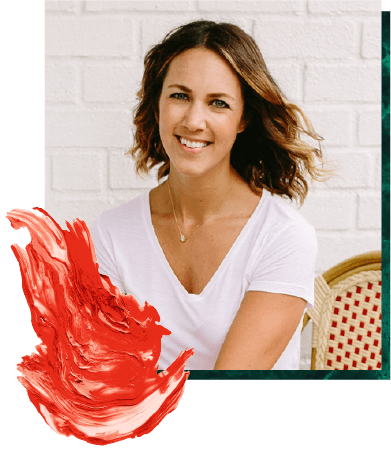
about
Alissa Rumsey, RD.
Alissa Rumsey, MS, RD, CDN, CSCS (pronouns she/her/hers) is a registered
dietitian, nutrition therapist, certified intuitive eating counselor, and the author of
Unapologetic Eating: Make Peace With Food and Transform Your Life. Alissa is
passionate about helping people reclaim the space to eat and live,
unapologetically.

A twice-a-month round-up of inspirational stories, lessons, practical tips and encouragement for living your most authentic, unapologetic life.
The Unapologetic Life
RECENT POSTS

The Unapologetic Life
A twice-a-month round-up of inspirational stories, lessons, practical tips and encouragement for living your most authentic, unapologetic life.






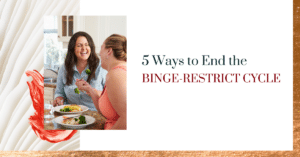
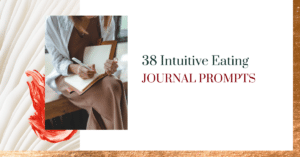
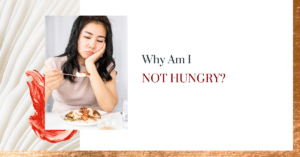
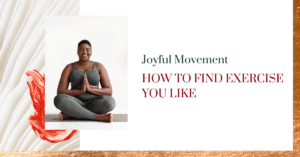
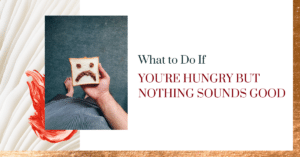
I cried reading this! I just recently realized I have a binge-restrict eating disorder that’s been keeping me trapped, depressed And is ruining my health. It’s been going on for years.
This was the most freeing thing I’ve read. You truly understand what it’s like! People would often tell me to eat in moderation and that’s such a trigger word for me. As soon as you say I can have 3 cookies a night I all of the sudden want 10. As soon as I eat more than 3 I feel like I failed and I binge. But the idea of stocking my pantry and having abundance and learning to intuitively eat verses implementing yet another rule is exactly what I needed to hear!
As I’ve been trying to develope this new mindset I’ve over eaten a lot and I really needed to hear what you said, that it’s ok if you over eat at first and that happens and it’s normal. My old mindset crept up and was tempting me to cut it all out (restrict) because I over ate. But instead I’m just going to trust the process.
Your words have given me hope and a sense that freedom is around the corner. I literally wrote down almost the entire article in my journal to keep these words in front of me as I heal. I’ve never thought this way before and I can’t wait to start the process of having a healthy relationship with food.
Thank you, thank you, thank you so much!
This is wonderful advice. I admit I haven’t used it yet 🙂 …. but, anyone who’s read this far down the page knows the panic that food choices cause. I’ve always struggled like the first poster did – if I give myself “permission” to eat something tasty, I’ll eat so much of it until I’m forcing myself finish, even though I’ve lost the desire to eat it. It’s like a emotional drill instructor is forcing me to eat, while my mind has drifted off to the next tasty thing I crave.
I’m hopeful that this technique will give me the feeling of being able to control a small aspect of being able to enjoy those ‘trigger foods.’ Because I know firsthand that plain old restricting just doesn’t work in the end.
Thanks for your thoughts Dora! I’d love to hear how it goes if you start trying this 🙂
The thought of bringing my “trigger foods” around the house scares me senseless! I feel like I will go off the rails and eat until I cannot move. See, I don’t trust myself around food, never have since I realized that I have a “weight problem”, back when I was 16 (now 40). Back in September I visited family, obviously I could not control what was in their fridge and pantry. I ate my “off limit” foods with reckless abandon. As my stay was winding down, I noticed that the foods did not quite appeal to me. I could take them or leave them and in most cases I left them or, I did not overeat them. I was shocked and pleased with myself at the same time!
However, I went back home and got right back on the binge-restrict cycle.
Reading this article was helpful and I am slowly trying to wrap my head around letting go of diets and eating intuitively!
Hi Jasmine, thanks for sharing! It sounds like that visit to your family’s house inadvertently started you on the process of making peace with food 🙂 It’s certainly a process and takes a while to get out of the cycle, but it is possible! Feel free to poke around more on here – I have a series of posts about intuitive eating – alissarumsey.com/category/intuitive-eating. Keep me posted!
I’m recovering from restrictive eating. Have a meal plan and therapy. However my food isn’t on a level playing field still-i still feel like certain things are bad or worse than other foods and will make me gain weight. Do I need more exposure, so eat those things when I want? At the moment I’ve been having a “fun food” (in the plan) in the afternoon, so I don’t eat them in the morning or after lunch for example. Would it be better to eat them anytime if I have a thought I’d like them? At the moment I probably keep them for that fun afternoon time
Hi Emma, first off, it’s wonderful that you are getting support and help with your restrictive eating! I can’t give specific advice regarding sticking to your eating plan vs. moving away from the plan towards eating by hunger/fullness cues – however this would be something to discuss with your therapist. An eating plan is important especially when you’ve lost hunger/fullness cues and/or are working to get back to a stable, consistent eating baseline. As for the thoughts of certain foods as “bad” – it can help with begin noticing these thoughts, thinking about where they come from, then reframing them. Check out this blog on the food police, which talks about this more: https://alissarumsey.com/nutrition/how-go-get-rid-of-food-police/
I thought I was doing the habituation technique but maybe I’m doing something wrong? I feel like I’m addicted to nut butters. I absolutely love them and try to keep to the serving size but that rarely happens and then I find myself halfway through the jar. I used to be even worse with disordered eating habits like measuring and binging and restricting. So I’m not really sure what the solution is. If I keep this up I’ll definitely gain tons of weight and if I don’t buy it I’ll just feel like I’m depriving myself. I’ve gone up and down in weight so many times and I just don’t want to do that anymore. I am 23 years old.
Hi Sara, it’s really common for it to take a while to habituate. It sounds like you are physically allowing yourself to eat the nut butter (which is step 1!) but if you are still mentally restricting at all, like having thoughts of “I shouldn’t’ be eating this much” or “I won’t eat as much of this tomorrow”, then your body still has trouble trusting you and will react by having increased cravings. So catching, and reframing, that mental restriction is key to help move through this phase.
This is such helpful information. I can clearly understand the word “habituate” a food- where its presence is not a going to make me feel like abusing it. I am also a peanut butter and chocolate “abuser” so now I have it as an anytime food if I feel “hungry” which is still confused with “hangry”. I now think I’ll have what I crave instead of “healthy choices” when truly hungry and yes, it’s satisfying to break the norm, but the next time I’m hungry- I want nutritious food! so weird for me to find I crave fruit, turkey or salad. I’m still learning the ropes,your programs and blogs are very helpful. It does take time. Thanks for providing all this support!
I’m so glad you found this helpful Robyn!
I love reading your blog posts and this one is super fascinating. I am new to intuitive eating. My wife introduced it to me and it makes a lot of sense but I’m trying to figure out how to have food around with kids in the house. We have 9 at home and I just see my food bill going off the charts. Is their a way to slowly introduce this to children that have been restricted in the past?
Hi Paul, this is such a great question. I totally hear you – kids will go through the same thing that adults do when given access to food that was previously restricted. That said, it will adjust over time, as long as they have continued access to the food. Are you familiar with Ellyn Satter’s division of responsibility? I’d highly recommend checking it out as I think this will be helpful for you ask you work to not restrict access to food, but also to watch that food bill 🙂 Here is a good overview: https://www.ellynsatterinstitute.org/how-to-feed/the-division-of-responsibility-in-feeding/. I haven’t read her books but other colleagues of mine recommend them.
can i ask a question ? iv been trying to intuitively eat for at lest a month now but i just am really bad at telling when i’m full. plus i never say no to chocolate or cake even if i don’t feel like it. what do i do 🙁
Hi Sofea, intuitive eating takes a lot of time and patience to practice, so be gentle with yourself – this doesn’t happen overnight. It’s important to make sure that you are rejecting the diet mentality, getting rid of mental and physical food scarcity, AND honoring your hunger, by eating each and every time you are hungry, before focusing on fullness. Because if you’re still in scarcity mode (this often happens mentally, even if you’re allowing yourself to eat all the things physically) and if you’re not eating every time you’re hungry, it’s really tough to stop when full. I find that taking the focus off of fullness, and focusing on the other principles, is really helpful. If you’re still struggling, I highly recommend working with an intuitive eating dietitian! My team and I offer this service (www.alissarumsey.com/nutrition-coaching); you can also search for dietitians on the intuitiveeating.org.
This is great information and advice! I’ve been craving Talenti gelato for a while, and will restock it in my refrigerator. Once I get tired of it, though (which will be inevitable) am I supposed to repeat the process and find another previously off-limit food and restock it at home? I worry that will lead to weight gain. Also, would you recommend against restocking more than one “off-limit” food at a time? Thanks for the insight!
Hi Michelle, great question – in terms of stocking more than one previously “forbidden” food that really is up to the person. Some people do really well fully stocking their house with a variety of ‘new’ foods; other people find this overwhelming and like to do one or two things at a time. Neither is right or wrong, both are great practice to be able to habituate to those foods being around and to make peace with food.
Hi Alissa this article was really insightful, thank you! I have been doing intuitive eating for about a month now and have been very slowly introducing “off limit” foods. However I found myself obsessing about loosing weight and body checking as I recognized that I was losing weight. So this weekend I reintroduced a bunch “off limit” foods to help take my thoughts off of losing weight, but it did not end well : p. I don’t think that was the answer.. back to the drawing board lol. Do you think its ok if it takes over a year to reintroduce foods back in? I feel for me it might help to focus on some of the other intuitive eating principles, before I focus too much on the off limit foods.
Hi Lily, it can feel very overwhelming to add back in all your “off-limits” or “forbidden foods” all at once. If this is the case, try adding one or two at a time – work on habituating to them and making peace with them, before trying to add another one. This process can take time, so try to be gentle with yourself.